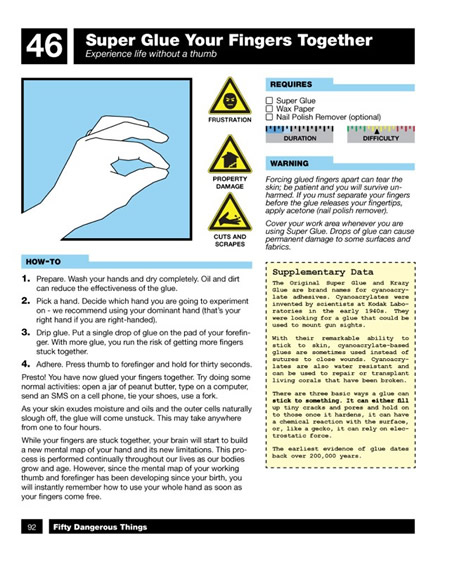Published: February 21, 2010
If you clicked on my Clipmarks today (check them in the sidebar), you will see that I have included 2 clips about Gever Tulley and Julie Spiegler new book Fifty Dangerous Things (You Should Let Your Children Do).This book is the first book from the people who created Tinkering School. With projects, activities, experiences, and skills ranging from “Superglue Your Fingers Together” to “Play with Fire,” along with 48 other great ideas, the book is a manifesto for kids and parents alike to reclaim childhood. Why Fifty Dangerous Things? First off, Five Dangerous Things just weren’t enough (although the audience at TED thought it was a good starting point)
Here’s a page from the book…. As a parent are you guilty of wrapping your kids in cotton wool ? …. tell us what you think – are you for or against the premise behind the book?

Published: February 16, 2010

Image: iStockphoto
he findings of the independent Belgian and Dutch research projects will be presented at
Helping Families Change, an international parenting conference at the University of Queensland on Wednesday February 17 and Thursday February 18.
In the Belgian study, conducted at a youth mental health unit at the University of Antwerp, mothers who had a child receiving psychiatric care (for conditions including depression and anxiety) completed an eight-week Group Triple P program, in addition to their own regular therapeutic support and the child’s usual treatment. [continue reading…]
Published: February 12, 2010
Children and adolescents who refuse to attend school should not be given doctors’ sick notes. In the current issue of Deutsches Ärzteblatt International (Dtsch Arztebl Int 2010; 107), child and adolescent psychiatrist Martin Knollmann and colleagues explain the causes of school avoidance and describe measures to tackle the problem. [continue reading…]
Published: February 4, 2010
Parents take heed: children and young adults are more likely to pursue sports, music or other pastimes when given an opportunity to nurture their own passion. According to a three-part study led by Geneviève Mageau, a psychology professor at the Université de Montréal, parental control can predict whether a child develops a harmonious or obsessive passion for a hobby. [continue reading…]

